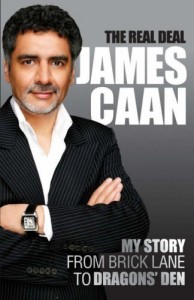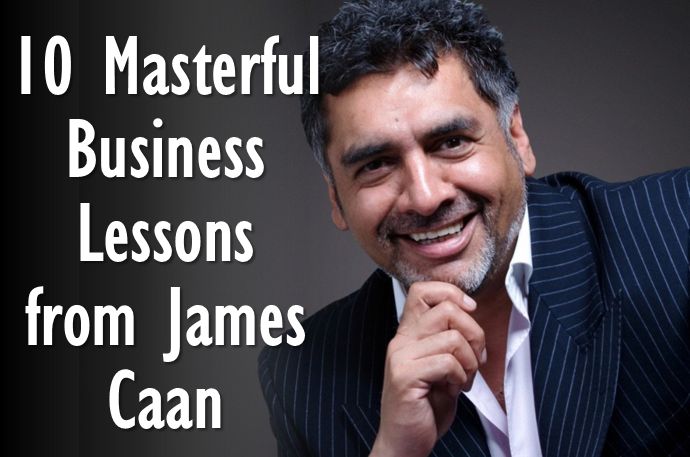While many people in the US don’t know him, in 2014 James Caan surpassed 1 million followers and is now the 7th most followed person on LinkedIn in the world. His book, The Real Deal, is a fascinating account of his story ‘from brick lane to Dragon’s Den’, the popular UK show which is the predecessor to Shark Tank in the US. In a way, James Caan is like the British version of Mark Cuban.
His book is an autobiography and an incredibly interesting story of how he went from being a school dropout immigrant to ultra-successful business mogul that was driving as Rolls Royce at 24. You can attribute luck, personal skill and charisma to his success – like that of anyone. And yet, the book captures a business philosophy that is worth studying. These are the most important business principles I learned from reading The Real Deal:
1. Know your Strengths, Delegate and Hire the Best.– After dropping out of school, James Caan was unsure where he could find success. He decided to look at his strengths: James figured he was good with relationships, reading and connecting people. This led him to start a very successful career in recruiting. He always understood what he was good at, and focused his career on making the most of it.
James also understood what he was not good at. As simple as it sounds, delegating is one of the hardest things for an entrepreneur to do. James understood you can’t be the smartest guy for everything and that you can’t scale your business unless you delegate. In his words “My skill is knowing where to hire a man that knows how to hang a picture better than I do.” Through his career, James always looked for experts in each field and trusted them with the job to be done.
2. Curiosity is the Foundation for Knowledge. James was in constant learning mode. Before he embarked in a new project, James asked a lot of questions, invested his time researching, looked for smart people in that field – and listened. This kind of hunger for knowledge, the willingness to absorb all the knowledge he could get his hands on, allowed him to study the unique business model of one of his early employers and apply it to the recruitment industry, building an empire in the process. Intellectual curiosity is one of the foundations for success, in business and in life.
3. Understand the Customer Perspective. When James started his first business, he was having trouble landing deals. The key to breaking out was customer empathy: “Putting myself in the position of the people taking my calls is what really turned things around”. Some time later, when he was trying to find business, James asked himself “What would have caught my attention when I was hiring? If I was a candidate, what would I like to hear to be Interested?”. Customer empathy -understanding how your customers feel, what they want, what problems they are trying to solve- is one of the most foundational skills for a good marketer – and any good entrepreneur.
4. Brand Matters & First Impressions Count. Early in his life James understood the power of words when he changed his name from Nassim Khan to James Caan (after the famous actor). When building his first company he knew how important appearances are in a service business, and the importance of what you call the business itself – the power of branding. He wanted a name that communicated his was an established business, with gravitas, integrity, and professionalism.
He thought of the business as a person who would have the same specific attributes: dynamic, smart, educated. Then he asked himself, What would be that person’s name? He came up with Alexander Mann. Where would their offices be? His answer was Mayfair, a prestigious location in London. Any office space in Mayfair was expensive, but he knew it was a sound investment, even though he could have started on a shoe-string at home. When starting his investment business, which he still runs today, he followed a similar process, resulting int he name Hamilton Bradshaw.
5. Business Success is Based in Creating Unique Value. James learned a valuable lesson from his father: to observe the masses and then do the opposite. He was going to start a new recruitment business but there were already 10,000 recruiters in the UK. He needed to do things differently. “Me-too business are notorious for failure. Without a unique selling proposition (USP) you are dead in the water.”
He figured his USP: First, he would only charge customers if successful. Second, in an industry that had average talent and no sales culture, he would hire the best sales people – the margins allowed double the standard commission . Last, he would specialize. Alexander Mann focused on financial services recruiting. James understood language and the Industry. Being a niche market player makes you a leader. His unique proposition was: specialization, a better team and clear value for customers.
6. Know Your Numbers and Evaluate Your Risk. A good entrepreneur has a command of the fundamental metrics that drive the business: clients, revenue, commissions, costs, capacity, etc. You have to understand every part of your business. Having a firm grasp of fundamental business numbers allowed him to make better decisions.
When considering a venture or a business, James looked at the optimistic numbers, then at the worst-case scenario, and last figured what was his break-even point. This quantification allowed him to take calculated risks, evaluate if the projections are realistic and understand his total risk. For James, decision making to start a new venture was simplified to a simple question: ‘Do I believe in myself enough, and do I believe I can produce this amount of revenue in this much time to break even?”
7. Go for Win-Win. Invest in People. In business, it is common to try to extract the last drop from employees, partners and suppliers. James, on the other hand, believes in win-win negotiations and true partnerships where every side is compelled to do their best job and feel fairly treated. This philosophy starts with employees: his business strategy was to offer premium service, so he offered employees a great salary, which allowed him to hire the best talent, which built his reputation as the best, resulting in business success that gave him the margin to make this a virtuous circle. James recognized and rewarded key team members ahead of time.
One day, a promising employee expressed his appreciation for James’ car. Believing the new employee was going to do well, he simply handed the keys to the Porsche, asking to be paid with future commissions that he trusted the engineer would earn. The excitement and buzz generated by James faith in his team, resulted in record sales.
Throughout his career, as an investor, James invested in people, not in business plans. He believes in sharing the wealth, paying generously, and sharing profits with employees and partners. With suppliers and partners, he negotiated hard. Then he asked them “Are you satisfied with this deal?” He wanted to make sure the other party was as excited as he was as working together and not in a situation where they sign a contract to do a job for a very slim profit. Often he re-negotiated, offering more money to ensure the partner or supplier did their best job.
8. Start Small and Enjoy Your Success. James experienced first-hand entrepreneurs who invested everything back into their business only to see all their work go in smoke in an economic downturn. He also saw people who extracted the capital from the business to spend it lavishly, depriving it of oxygen.
The balance James found as not to spend what the business cannot afford but enjoy the fruits of your work early. Even though he had plenty of cash, when he started Alexander Mann, his first office was a windowless closet that used to be a cupboard. A couple years later he purchased his Rolls Royce when the business had enough cash on hand to make it a reasonable purchase.
9. Sell Your Value, not Your Services. James excels as a marketer: he understands the specific value his business brings to his clients. With Alexander Mann, he realized pitching his company (a recruitment firm) or his services (filling open positions) was not nearly as effective as providing immediate value. His pitch evolved from ‘I am a recruiter. Do you have open positions?’ to ‘ I have this guy, Craig, who is a top performer with a fantastic rolodex. Are you interested in speaking with him?’ In an age with an oversupply of services and little differentiation, offering concrete value makes you immediately attractive to prospects.
10. Optimize to Grow and Let Go. James kept innovating, never resting. Despite great success he looking at ways to improve his business to learn from others and to optimize. He always looked for new ideas and new ways to take advantage of his assets and experience. As a business grows, entrepreneurs need to give up control. You become your own limiting factor. Trusting the business you created with sweat and tears to others is very hard for any entrepreneur. But you must recognize that building a company and growing a business requires a different skill set than starting a business. At one point you need people who can build systems and processes.
The book is a great read, a very personal story on entrepreneurship and life. It is hard to capture all its business insight in a blog post. Grab a copy of The Real Deal: My Story from Brick Lane to Dragons’ Den or follow James on twitter.


